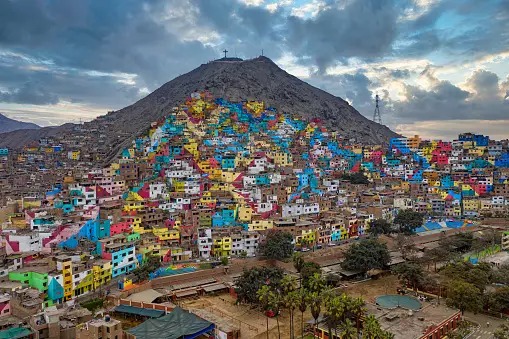
Slum tourism, also known as poverty tourism or township tourism, involves visiting economically marginalized urban areas to gain insight into the daily lives of residents facing challenging socio-economic conditions. While this form of tourism has been met with mixed reactions and ethical considerations, it has also demonstrated several potential benefits for both tourists and the communities being visited. This comprehensive guide aims to delve into the positive impacts of slum tourism, shedding light on the transformative effects it can have on individuals, communities, and the tourism industry as a whole.
Understanding Slum Tourism
Slum tourism involves guided visits to impoverished neighborhoods and informal settlements in cities worldwide. Tourists have the opportunity to interact with local residents, observe living conditions, and gain a deeper understanding of the socio-economic challenges and cultural richness within these communities. While the concept may initially seem controversial, proponents argue that slum tourism can contribute positively to various aspects of society.
Benefits of Slum Tourism
1. Cultural Exchange and Understanding
- Cultural Immersion: Slum tourism allows visitors to immerse themselves in the daily routines, traditions, and customs of communities they might not otherwise interact with. This fosters cultural exchange and promotes understanding between individuals from diverse backgrounds.
- Breaking Stereotypes: By engaging directly with residents of marginalized areas, tourists can challenge stereotypes and misconceptions, leading to a more nuanced and empathetic view of the local population.
2. Empowerment of Local Communities
- Economic Opportunities: Slum tourism can generate income and employment opportunities for local residents, as guided tours often involve hiring community members as guides, artisans, or vendors. This economic empowerment can contribute to poverty alleviation and sustainable development.
- Community Pride: Hosting tourists can instill a sense of pride and agency within the community, showcasing their resilience, creativity, and unique cultural heritage to a broader audience. This recognition can boost self-esteem and promote community cohesion.
3. Awareness and Advocacy
- Raising Awareness: Slum tourism sheds light on the harsh realities of poverty, inequality, and social injustice faced by marginalized populations. By witnessing these conditions firsthand, tourists are motivated to advocate for social change, support local initiatives, and contribute to poverty alleviation efforts.
- Educational Value: Visiting slums can serve as an educational experience, highlighting the systemic issues that contribute to urban poverty and challenging visitors to reflect on their role in addressing these challenges both locally and globally.
4. Promotion of Responsible Tourism
- Ethical Engagement: Responsible slum tourism operators prioritize respectful interactions, ethical practices, and sustainable tourism principles. These operators ensure that the tours benefit the community, respect residents’ privacy and dignity, and contribute positively to the socio-economic fabric of the area.
- Cultural Preservation: By supporting community-led tourism initiatives, visitors can contribute to the preservation of local culture, heritage, and traditions. This form of tourism encourages mutual respect and appreciation for cultural diversity.
5. Challenging Perceptions and Promoting Social Justice
- Social Justice Advocacy: Slum tourism challenges traditional power dynamics, raises awareness about economic disparities, and advocates for social justice and equity. By confronting uncomfortable truths about poverty and inequality, tourists are compelled to reflect on privilege, empathy, and global solidarity.
- Promoting Social Change: Visiting slums can spark conversations about systemic issues such as housing affordability, access to education, healthcare disparities, and urban planning policies. This dialogue can inspire advocacy, policy reform, and community-led initiatives aimed at addressing root causes of poverty.
6. Economic Benefits for the Tourism Industry
- Diversification of Tourism Offerings: Slum tourism diversifies the tourism landscape, offering an alternative to traditional sightseeing and beach vacations. This niche market attracts travelers seeking authentic and immersive experiences that combine cultural immersion with social impact.
- Sustainable Tourism Practices: Responsible slum tourism promotes sustainable tourism practices by engaging with local communities, minimizing negative impacts on the environment, and contributing to the socio-economic development of host destinations.
7. Personal Growth and Transformation
- Expanded Perspective: Slum tourism exposes visitors to different worldviews, living conditions, and value systems, broadening their perspectives and fostering empathy and understanding. This exposure to diverse realities can challenge preconceived notions and inspire personal growth.
- Cultural Sensitivity: Interacting with residents of slums cultivates cultural sensitivity, tolerance, and appreciation for the resilience and creativity of individuals living in challenging circumstances. These experiences can lead to personal transformation and a deeper sense of global citizenship.
Challenges and Ethical Considerations
While slum tourism presents numerous potential benefits, it is crucial to acknowledge the challenges and ethical considerations associated with this form of travel. Issues such as exploitation, voyeurism, privacy violations, and misrepresentation of communities must be carefully addressed to ensure that the positive impacts of slum tourism are not overshadowed by unethical practices. Responsible and sustainable slum tourism initiatives should prioritize the following ethical considerations:




